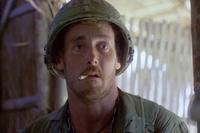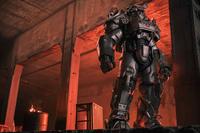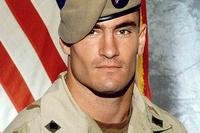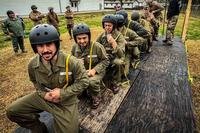Red Platoon is an exceptional book. By the time Medal of Honor recipient Staff Sgt. Clinton Romesha wraps up his meticulous and powerful telling of the 2009 battle at COP Keating in Afghanistan, you realize that he's given you clear and detailed descriptions of the action and vivid portraits of the men he served with that day. In Romesha's telling, the heroic actions that led to his medal are given equal weight with the efforts of his fellow soldiers.
The book also avoids the kind of freelance policy analysis that's become standard in most modern military memoirs. There are plenty of reasons to question why COP Keating existed in the first place, but Romesha emphasizes his place in the chain of command and concentrates on describing the actual events. Rather than write solely from his own memory, he interviewed as many men as possible and incorporated their versions of events into the book.

This graffiti became Red Platoon's motto during its deployment at COP Keating. Obviously, it can go either way.
Clint Romesha took time to speak with us about the book and his own experiences as a veteran looking for employment and how he made the transition back to civilian life.
So I guess this isn't really a memoir, is it?
Not per se, no. Kind of reflect on a few things from growing up, but it does concentrate quite a bit on the Battle of Keating in 2009.

Map of COP Keating
What's most impressive to me is how reported the story: you talked to other men who were there and you integrate everyone's story into one narrative.
The motivation in doing the book was being able to bring in all the perspectives of the guys that were there. I wanted to give them the ability to voice what they had seen and done and give them credit for all the heroic and courageous actions they did that day.

Why did you decide to write a book?
After receiving the medal, I was approached about telling the story, putting it in print, kind of immortalizing it. I was a little hesitant at first. You know it's kind of a crazy time. A lot of stuff is coming at you at once.
After quite a bit of discussion with a lot of guys I'd served with and the families of the eight men they lost, the consensus was that the best way to tell the story was a first-person perspective from the guy who had boots on the ground. They had encouraged me. If anyone was gonna tell it in the most accurate way, it would probably come out of my voice.
%embed1%
Clint Romesha narrates part of his own audiobook.
I told them, “Well, if we're gonna do a book, it's not gonna be a book about Clint Romesha; it's gonna be about the guys, the 52 Americans that served with me that day and the 8 heroes that don’t get to tell their story anymore.” They would be more than welcome and encouraged to be part of the process. Allowing them would give a more rounded story and a better 360 perspective of everything that went on that day.

Clinton Romesha photo by Ray Taggart
Your book very purposefully avoids getting into whether the Army made a mistake in putting COP Keating in that particular location. Why did you avoid getting in a larger policy discussion?
It’s the mentality of soldiers. We live in an all-volunteer Army right now, so when these young men and women raise that right hand to say, “I will go and do,” they don’t get a choice after they make that commitment. The Army runs on discipline, military runs on discipline.

View of COP Keating from the North Face. The expression "fish in a barrel comes to mind."
Bad stuff and bad situations can happen at any time and it happens often. That’s unfortunate, but the real story isn't a story of “why it did happen?” I wanted to write about the courage and the true grit and just the America spirit shining through. We know it was a tragic day, but there are more important messages: I wanted to honor those that had came together, worked as a team and stood in the face of overwhelming odds and never backed down and never quit and continued forward.
That’s the message. We knew that the odds were stacked against us to start, but we didn’t let that hold us back from doing our jobs. I want readers to understand that we were over there fighting for each other. The motivation of love for your other man was more important than the story of why were we there.
%embed2%
Clinton Romesha receives the Medal of Honor from President Obama
Once you received the Medal of Honor, you had to make public appearances and I know you’ve been on television. What's that like? I'm sure that’s not something you anticipated or even something you really signed up for.
You know, I'm still not anywhere close to comfortable with doing a lot of it. I've always been kind of a just “sit in the back and observe” guy who doesn’t say too much. That came from growing up and lessons from my dad and my grandfather: “Don’t tell everyone how great or awesome you are.” Just let your actions show for you and don’t talk too much, because if all you're doing is talking then your words don’t carry the weight. When you finally do open your mouth and say something, people will listen.
It's been a change. It makes for an interesting experience when you have that kind of mentality going into it, but I understand that I’m sharing a message that needs to get broadcast.
We have heroes all among us. I'm nothing special, grew up in a small town in Northern California. Never in a million years would I have thought that I'd meet a Medal of Honor recipient, let alone be one. But I do have the mentality that we will all be faced with something in our lives at some point that’s not so big we cannot overcome it. We all have greatness in us and we've got to understand that.

Guys with hescos at Keating.
You say you were raised not to talk about yourself, but you tell your story about that day with an amazing clarity.
My father and my grandfather never talked much about their experience in combat with World War II or Vietnam. We live in a day and age where fewer people are serving. For the guys and gals who are taking on that burden, more responsibility is getting piled upon them.
We need to convey the message of the service and sacrifice. 99.5% of Americans haven’t served in today's current conflicts. We shouldn’t forget history and the service and sacrifice that came before us and lets us reap the benefits of today.
Instead of targeting the military audience, I wanted to write in a way that reached the 99.5 percent that might not truly grasp what the service and sacrifice is. I stayed away from writing 20 pages of acronyms and military jargon. I like to be short and to the point at certain times. That was the mentality and the structure and the layout of writing Red Platoon.
%embed3%
Clinton Romesha talks to CNN about his experiences that day.
A lot of memoirs from the conflicts in Iraq and Afghanistan seem to throw in some political red meat for the audience that always buys these books. Your book is really not playing to that crowd. It seems a much more inclusive way to tell the story. Was that a conscious decision?
Yeah, I know what you're talking about, reading some of the other memoirs from Iraq and Afghanistan. And as a veteran, you know you read it and you kind of pick up on that. That is something I consciously wanted to stay clear of. There's stuff in the book that I know comes back to that in a roundabout way, but the intent was to consciously stick to a different style. I wanted to try something a little bit outside the box.

View of COP Keating from the spot know as the "Putting Green." Be glad you weren't tasked with defending this ground.
One of our primary missions at Military.com is to help active-duty men and women make the transition to civilian life and help veterans find employment. What was your experience like when you decided to leave? How did you find employment and get yourself integrated back into civilian life?
As I made that transition, I actually did reference Military.com quite a bit on benefits, especially benefits for the state where I was potentially looking to move. That helped me to guide the decision making process. It’s a huge thing when you're making that transition out to have that help.
I started researching within the last eight months of service. Being in for almost 12 years at that point, it was a scary time to transition out, not knowing what next was gonna be. From the time I was 18, all I ever knew was the military.

Luxury accommodations at Keating
I was fortunate that, when I made the transition out, the old fields in North Dakota were really happening, so it allowed me to transition into a very rich environment and to get into a job that had plenty of room for expansion, plenty of time to stay busy. So I wasn’t dwelling. You didn’t have a lot of downtime working six to seven days a week, 12-16 hours a day. You didn’t have a lot of time to kind of think about some of the military stuff in the past because you were concentrating more on the next day and just keeping your mind focused on the new job and learning a new skill.
As I made that transition out, I really started to see the language barrier with a lot of the civilian occupations, the ones that don’t have veterans integrated into their HR departments. It’s a challenge breaking down that language barrier when you’re writing your resume, getting your experience out there in a language they understand. Initially, as a cav scout, I wondered, “Who needs a guy that can carry 60 pounds on their back and run 2 miles in 12 minutes and can shoot 300 yards with the M4 rifle?”
As I got into the process of the hiring and resumes, I quickly learned what they were really looking for is people that can show up to work on time, understand rules and regulations and operate with minimal guidance and use initiative. To be able to mentor, listen, and then interact with all different walks of life. And that is something you get taught from day one of Basic Training or Boot Camp. It was great to finally kind of break through that wall and realize how my skills translated.
Now on the flipside, I’m able to talk to future employers here in the interview field about these qualities and offer a testament to the character of hiring veterans.

Brad Larson and Daniel Rodriguez
Was it a hard transition working with people who had no experience of military culture?
It was a challenge going from the military, where you're working basically on salary. There's no schedule of when you're actually gonna get off work. And having that motivation of, “Hey, let's get the job knocked out, let's get work done so we can relax.” And coming to the hourly wage world, it's kind of a different mentality of, “Well, let's kind of drag out this job a little longer.” That was kind of a shock to see. Well, no, let's hurry up and get this job done and let's get it right the first time.
The other thing was sick days. Being able to call in sick was mind-blowing to me the first time I had to do it after having a stint of food poisoning the night before. I had to call my supervisor and ask what clinic I had to go to first before work so I could get a note from the doctor that said I was actually sick. When he explained that , no, you just call in, we'll believe you over the phone, that was definitely a shock.

Spc. Stephan Mace tends the burning poo.
What happened when you got the news that you had to go to Washington for a Medal of Honor ceremony? How did your coworkers react to that? Did they really know that much about your military history when that moment came?
I had a few coworkers that were prior service. I told them first, before I talked to my higher up echelon leaders at the company, to get their gauge on how you tell a civilian about the Medal of Honor and the weight behind it and what might come of it. To be able to work alongside other veterans who have made that transition and talk with them about it was also was a good benefit to tap into. Even though we were still all very confused between the three of us on how to tell my employers about the medal.
When I finally did break the news to my employer about, “Hey, I’ve got this thing that I've got to do in D.C. because of my prior service. And it's kind of a big deal.” I was fortunate enough that my employer was pretty well tuned-in to military and military service and what the Medal of Honor represented.

The Humvee known as Truck 2 was one of the primary lines of defense for COP Keating.
With the change in the oil business over the last couple of years, has that changed your employment situation up there?
It has. I had a really great employer that allowed me to do a lot of my travel and to do outreach with the Medal of Honor's character development program and other nonprofits I support. As things started to slow down in the business, I just asked to be able to step away. At that point, I was about to get started on the book and I knew that was gonna be a very time-consuming process, so I stepped away so they didn’t have to fire someone else or lay someone else off for the time being. I could pursue doing other things, which was great of them to allow me to do. They want me back as soon as I can come back and will let me pick up where I left off.
%embed4%
For a real soldier, killing Taliban fighters is probably easier than going on Letterman.
Has anyone approached you about movie rights yet? Are you allowed to talk about that?
We have been approached. We're in negotiations for stuff with Sony Pictures. It doesn’t mean that a movie will be made, but, after talking to some of the families I decided to try. It’s so great to be able to lean on some of these family members and share this whole experience and have them involved.
They very politely explained to me that my generation are not big readers and, to really get the story out there for the eight men that can no longer tell theirs, the best way to get more people aware of the story in this country is by having it promoted and filmed by Hollywood.

What remained of Keating after the battle.
Thanks for taking the time to speak with us.
I really do hope that more Americans and transitioning veterans truly share their stories to those that didn’t serve and continue to remind the country of the service and sacrifice of the men and women who can't tell their stories and to help Americans understand that, yeah, life still goes on after service and it's on us to make sure we watch out for each other and we help each other. We're a community that is like no other.




